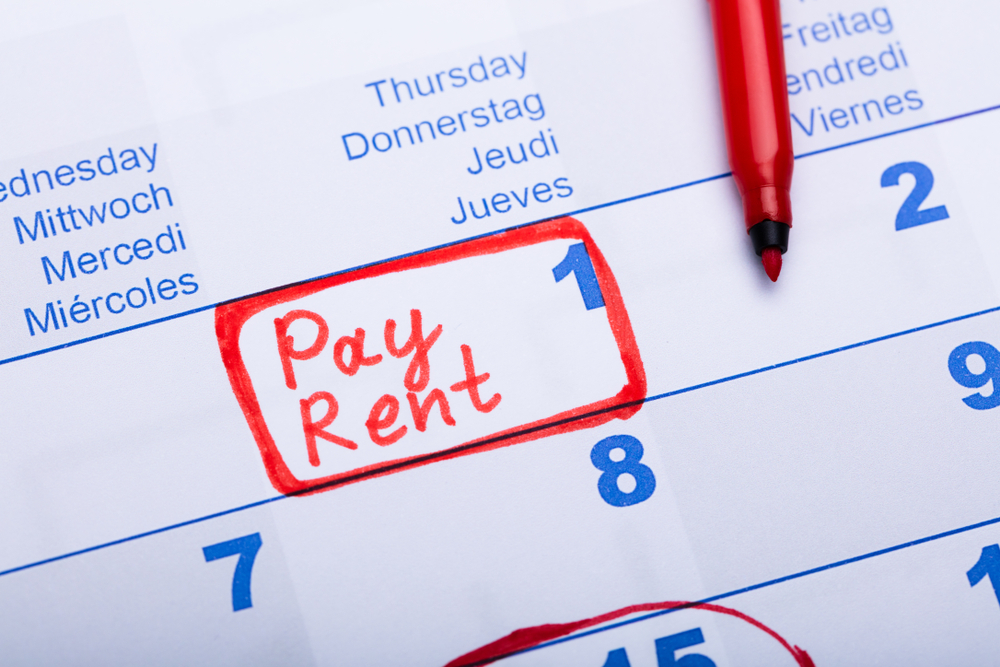Rent is a significant expense for most households, and rent prices continue to rise in many cities. About 6 million people — or about 15 percent — are behind on their rent. Americans ages 40 to 54 have the most trouble paying their rent.
Unexpected events can cause you to be unable to pay your rent on time. Here are tips on what to do and avoid doing if you have trouble making a timely rent payment.
Can’t Pay My Rent on Time – How To Fix It?
1. Talk With Your Landlord Ahead of Time

Sometimes folks avoid difficult conversations, but, in this case, talking with your landlord is a critical first step. Your landlord may be counting on your rent payment to pay the mortgage on the property. You can only avoid the landlord’s phone calls for a short time. Best to take charge and try to negotiate a solution.
Your lease is a legal contract and governs your rental payments and relationship with your landlord. Prepare for the conversation by reading your lease carefully. Some leases include a grace period of five to ten days before the landlord charges late fees and penalties. Your lease may also specify a grace period during which you can pay your late rent and avoid eviction.
During the conversation, be polite. Explain why you are late. If the problem is temporary, be sure to emphasize that. Never lie about your circumstances. For example, if you claim you’ve missed work due to illness, the landlord may ask for documentation. If you’ve lied and can’t produce, the landlord will no longer trust you and may stop negotiating.
Throughout the discussion, work with the landlord to reach an agreement that is fair to both of you, remembering that the landlord does not have to accommodate you. For example, you can offer to make a partial payment on the due date and pay the remainder at another agreed-upon time. Be prepared to pay a late fee.
2. Get It in Writing
If you reach an agreement with your landlord about your late rent, put it in writing. A written contract protects both you and the landlord.
3. Never Knowingly Bounce a Check
One of the worst ways to deal with a rent crisis is to send a check anyway, even though it will bounce. Landlords will consider a tenant less trustworthy who bounces a check rather than being upfront about their financial problems. Negotiating a deal to pay your rent late will be much more difficult if you’ve already bounced a check.
In some cases, a bounced check is grounds for eviction. In almost all cases, it will bring additional fees. Bouncing checks is also a crime in most states.
4. Prioritize the Rent Payment
Planning is often a key to handling temporary financial crises. If you can, set aside a portion of your paycheck each month for a rainy day fund. Then, when you find yourself short of your rent money, you can dig into the fund.
Of course, setting aside money isn’t always possible. However, if you see that a month is financially challenging, prioritize paying your bills. Shelter and food are top priorities. Pay these first. Also, credit card companies, schools, and insurance companies can often be more lenient than a landlord who depends upon your rent payments to meet their obligations. Contact these other vendors to ask for an extension first.
Some states have rules that require healthcare providers to allow you to extend medical payments over time. Even in states without laws, nonprofit hospitals often approve long-term payment arrangements with small monthly payments.
5. Check with Charitable and Government Organizations

Local organizations or local offices of national organizations can sometimes help you pay the rent. Examples are:
- The Salvation Army
- Catholic Charities
- Jewish Human Services Agencies
- The U.S. Department of Housing and Urban Development
- Modest Needs
- Emergency Rental Assistance
- Local churches
- Some state agencies
6. Evaluate Your Budget
Sometimes emergencies, such as car repairs or illness, render you unable to pay your rent temporarily. However, the inability to pay rent often comes because the budget is already stretched.
If your budget is constantly stretched, so you can’t set aside emergency funds, you want to re-evaluate it. Look through your budget for expenses you can trim. Key areas to look at are streaming services, gym memberships, subscriptions, and eating out.
If you’re overrun with credit card debt, call the credit card companies and negotiate smaller minimum payments. If you have a federal student loan, you may be able to obtain a deferment.
Also, look at the income side. You may be able to increase your income with a side hustle, for example.
7. Apply for a Loan
Another option when temporary financial challenges are causing you to have trouble paying rent is to take out a loan. However, carefully consider the implications before applying. A loan means you have to make an additional monthly payment. Make sure your financial difficulties are temporary, and you can afford the monthly payback.
If you decide to go for a loan, try borrowing from family or friends first. They are less likely to charge interest. If you must go to a financial institution, consider a credit union, which may charge a lower interest rate. Otherwise, try a reputable bank. Be sure you understand the interest rate and the amount you’ll have to pay each month.
Consider a cash advance if you only need a small amount of money and have credit cards. You can often receive a cash advance by entering your PIN at an ATM or by taking your credit card to a local bank or credit union. However, cash advances are costly ways to borrow money. They generally have transaction fees and high interest.
8. Seek Legal Help
If all else fails, you may need to see legal help to avoid eviction. Tenant rights vary from state to state.
A good lawyer will know what remedies you might have in your state. You can often find inexpensive but good lawyers through nonprofit agencies such as Legal Aid. LawHelp.org can also help you find affordable or free lawyers in your area.
Key Takeaways
Many people struggle with their rent. However, you do have some options, especially if your financial difficulties are temporary. Often, you can convince other vendors or your landlord to be flexible, especially if you have a good payment record. Nonprofit and government agencies can often provide help.
If your financial problems are long-term, you’ll need to manage your expenses better and may need to renegotiate credit card and student loan terms. Free or low-cost legal advice can often help you avoid eviction.






